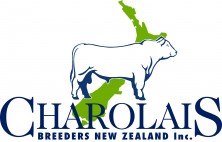
Progressive Ataxia Testing now available with PBB/Neogen
The function of the Charolais New Zealand Breeders Council is to help guide and facilitate all things towards the betterment of the NZ Charolais breed.
Progressive Ataxia or “PA” was identified in a bull back in 1964 and has only been seen very rarely intermittently for the following decades. This degenerative neurologic disease affects cattle as they approach two years of age and is characterized by uncoordinated movement of the hind limbs that gets progressively worse, ultimately resulting in immobilization of the animal. Recently however, PA has had a small but notable spike overseas which led to a number of countries re-evaluating the significance of PA and genetic testing becoming available for the genes through Neogen, allowing more strategies around PA control.
The good news is this is easy to manage genetically and can only occur when a carrier animal is mated to another carrier.
The Charolais NZ Breeders Council’s view on PA is that we as a collective group of breeders need to work towards implementing a strategic plan of managing and minimising the level of it in our national herd. In other countries so far, the frequency is around 85% clear, 15% carriers. A test has only become available to NZ breeders a couple of weeks ago, so we are going to adopt a strategy of testing, recording and communicating test results. We will also look to get a list of known carriers both here and overseas which will give breeders an idea of which lines might potentially be carriers, allowing consideration around minimising the breeding of carrier-to-carrier animals until further testing is done going forward.
This will have no effect at all on registration status and carrier animals are still perfectly fine to be used in all pure and cross breeding programmes. Single copy bulls pose no risk when crossed with other breeds, it is only when a carrier is crossed with a carrier that 25% of this progeny, on average, could potentially be double carriers and exhibit the disease.
CBNZ plans to neither cancel registrations nor restrict the use of PA carriers in our herdbook. Commercial use of PA carriers in terminal mating’s such as Beef x Dairy and Commercial Beef Crossbreeding should proceed without reservation as only carrier x carrier mating’s could result in an affected animal.
We do recommend all breeders test at least their potential 2023/24 sire team which will help them tailor their joining to minimise carrier to carrier matings.
Please don’t be overly concerned around this issue, it is something that has been around for many years with little known impact, within NZ, but we believe it is best to adopt a fully transparent, up-front approach by providing all our breeders as much information, knowledge and assistance as possible. Testing of a number of animals including recent sires is due to be done which will help give us a better picture of the actual prevalence of PA, and from here this will assist us to move forward ensuring it has the lowest impact on the New Zealand Charolais breed.
DNA orders can be processed through PBB:
https://www.pbbnz.com/services/genetics/bundles/charolais/
Hair cards and TSU’s also available from PBB.
DNA Requirements for Animal Registration
The following DNA requirements apply when registering calves in Charolais Breeders New Zealand (CBNZ) Herd Book:
New Registrations
For Sires, of calves born after 1 May 2016, a DNA profile must be recorded with CBNZ for the Sire.
For Calves born after 1 January 2024, a minimum of a 50K SNP profile must be loaded into the database and correct Sire Verification of the sire (where possible), must be recorded with CBNZ.
If the animal being registered was bred by artificial insemination (AI) or embryo transfer (ET), and the Sire and/or Dam do not have a minimum of a 50K SNP profile or genetic disorder results, for the resulting progeny to be registered the progeny must be 100K SNP profiled and have results recorded for all known genetic conditions for which there is a commercial test available.